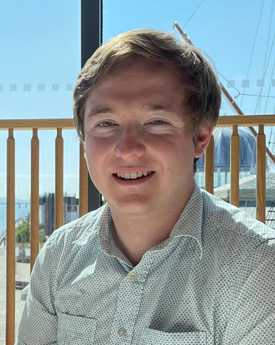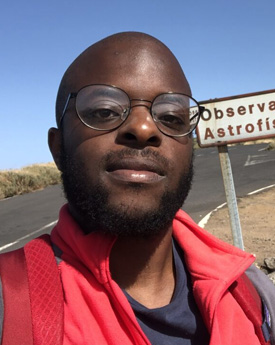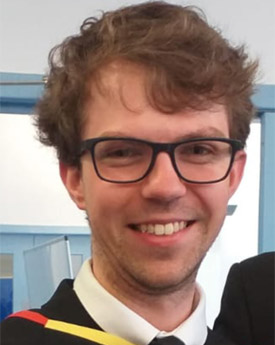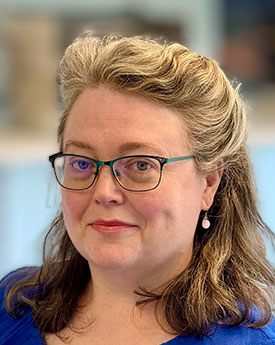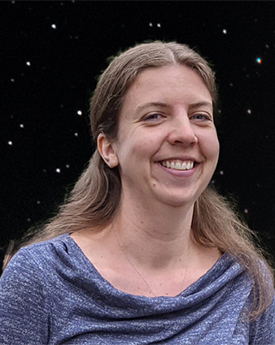
About us
Astrophysics is the study of the physical nature of celestial objects and the Universe in which they live.
The Astrophysics group at Lancaster was set up in 2015 within the Physics Department, complementing the existing Astro-particle Cosmology and Space and Planetary Physics groups.
The group's research is primarily observational and tackles some of the most important open questions in Astrophysics, broadly centred around understanding the formation and evolution of galaxies and the properties of the Universe itself. The group's research on galaxies includes detailed measurement of the stellar populations within relatively nearby galaxies and star clusters ("galactic archaeology") through to searches for the most distant galaxies observable. Through these studies, we can probe the earliest systems that formed in the Universe. Related research on the properties of the Universe includes measuring cosmological parameters such as the expansion rate and geometry of the Universe, and the relative fractions and properties of its constituents, including ordinary matter and the mysterious dark matter and dark energy.
This research involves making state-of-the-art observations using the world's most powerful telescopes such as the Hubble Space Telescope and the facilities of the European Southern Observatory, including ALMA and VLT. At the same time, the group is involved in the scientific planning for several new telescopes and instruments that will come online in the next 5-10 years and that will revolutionise research in astrophysics. These include the 4MOST spectrograph to be mounted on the VISTA telescope, the Large Synoptic Survey Telescope (an 8m diameter survey telescope), the 40m European Extremely Large Telescope and in space ESA's Euclid mission (a wide-field survey telescope for cosmology), ESA's FLARE mission, and the 6m diameter James Webb Space Telescope.
For information on the activities of some of our undergraduate and summer internship students plus the LancAstro conference series please see the XGAL website
Key research
- galaxy formation and evolution
- very high-redshift galaxies
- sub-mm galaxies
- supermassive black holes
- reionisation of the universe
- supernovae as cosmological probes
- dark matter and dark energy
- chemical abundances of stars, globular clusters and galaxies
- scientific planning for future telescopes and instruments
- citizen science
- machine learning for astrophysics
Fellowship Opportunities
We encourage researchers to consider the Lancaster Observational Astrophysics group as a host for prestigious postdoctoral fellowship applications.
Below is a list of fellowship opportunities available to astrophysicists. Some of these fellowships require the host department to provide full economic costings (e.g. RS URF), match funding (e.g. Leverhulme) or pre-select a list of candidates (e.g. STFC ERF, UKRI FLF). We recommend that you contact Professor Isobel Hook cc'ing Dr John Stott as early as possible in order to ensure that your application can proceed successfully. Many of the deadlines below are based on those from previous years so please check the organisation website for the correct date.
Fellowships Accordion
-
Astrophysics Specific Fellowships
- STFC Ernest Rutherford Fellowship
Deadline: usually mid September. Potential candidates should send final versions of the following documentation: description of the project, 1-page (max.); candidate statement justifying their suitability, and fit to Lancaster, 1-page (max.); CV with publication list (or highlights thereof, as appropriate) to Dr John Stott cc'ing Professor Isobel Hook and Dr Julie Wardlow by mid July 2024. - Royal Astronomical Society Research Fellowship
Deadline: usually October - Royal Astronomical Society Daphne Jackson Fellowship
Deadline: rolling application process - Royal Astronomical Society Norman Lockyer Fellowship
Deadline: usually same as RAS RF but not available every year (next calls expected 2021, 2024 and 2027)
- STFC Ernest Rutherford Fellowship
-
General Fellowships Available To Astrophysicists
- UKRI Future Leaders Fellowship
Deadline: see above website for details (please contact us early because of internal selection - see above) - Royal Society University Research Fellowship (URF)
Deadline: usually early September (please contact us in early July - see above) - Royal Society Dorothy Hodgkin Fellowship
Deadline: usually November - Royal Society Newton International Fellowship
Deadline: usually March - Marie Skłodowska-Curie Actions
Deadline: usually September (individual fellowship) - Royal Commission for the Exhibition 1851 Fellowship
Deadline: usually February - Leverhulme Early Career Fellowship
Deadline: usually late February - Lancaster internal deadline for candidates to submit a draft proposal and CV to the Physics Dept is early January so please contact a member of the astrophysics group staff before then
- UKRI Future Leaders Fellowship
PhD Opportunities
We encourage applications from excellent candidates wanting to pursue a PhD in Astrophysics.
Below is a list of our current PhD project opportunities. Our PhD projects are offered on a competitive basis and are subject to availability of funding. For more general information about PhD study in Physics at Lancaster, please contact our postgraduate admissions staff at py-pgadmiss@lancaster.ac.uk. You can also apply directly on our Physics Study webpage, stating the title of the project and the name of the supervisor. Once done, please also send an email to Professor Isobel Hook and Dr Brooke Simmons. For your application to be given full consideration please apply by the deadline of 29th January 2024. Letters of reference should also be received by the same deadline so please contact your letter writers in advance. Please note that you do not need to provide a research statement in the application and if you state multiple projects from the list below in your personal statement you will be considered for all of them.
Applicants are typically expected to have the equivalent of an upper second-class degree (2.1) in either Physics, Astrophysics or a related discipline.
We occasionally accept MSc by Research students. This is dependent on the availability of a suitable supervisor. Please look at the research pages of potential supervisors in order to find a fit to your interests.
Accordion
-
Distant Type Ia supernovae and dark energy
Supervisor
Professor Isobel Hook
Description
Dark energy is often invoked as the cause of the accelerating expansion of the universe, but its nature remains unknown. Several new telescopes and surveys will soon address this issue. This PhD project aims to advance the use of Type Ia supernovae as distance indicators for cosmology, using a combination of simulations and data from these new telescopes.
Specifically, the student will work on surveys with the Rubin Observatory, ESA's Euclid mission and/or 4MOST (the 4meter Multi-Object Spectrograph Telescope). These surveys will detect tens of thousands of new supernovae and their host galaxies with a range of imaging and spectroscopic observations at optical and near-infrared wavelengths. The project will start by working with collaborators to prepare for and collect the new datasets. The first dataset available is from the Euclid mission, which was launched in July 2023 and is now producing spectacular images that will be used to search for supernovae. As the dataset increases in size, the project will move towards searching for statistical correlations among various properties of the supernovae and their environments. This information will be used to improve the accuracy of Type Ia supernova distance measurements, and hence ultimately improve constraints on the nature of Dark Energy.Please contact Professor Isobel Hook for further information. This PhD project represents just one component of the research performed by the wider Astrophysics group at Lancaster University. Our PhD projects are offered on a competitive basis and are subject to availability of funding. For more general information about PhD study in Physics at Lancaster please contact our postgraduate admissions staff at py-pgadmiss@lancaster.ac.uk.
-
Galaxy clusters in the Big Data era with LSST
Supervisor
Dr John Stott
Description
Galaxy clusters are the largest gravitationally bound objects in the Universe, consisting of tens to thousands of galaxies within a relatively small volume. They are used extensively as laboratories for galaxy evolution, as they contain galaxies that have experienced a similar environment and processes over many billions of years. They are also key cosmological indicators with the evolution of the number of galaxy clusters of a given mass being very sensitive to the Dark Matter content of the Universe. Because of their importance for both astrophysics and cosmology it is desirable to obtain large, well understood samples of galaxy clusters over a range of redshifts. The Legacy Survey of Space and Time (LSST, is an imaging survey performed with the Rubin Observatory that will discover thousands of new galaxy clusters, providing such a sample. It will image the entire southern sky with an 8.4m telescope every few nights for 10 years, producing 200 petabytes of imaging data. This will be the state-of-the-art for optical surveys for many years to come.
This project aims to further develop pre-existing algorithms and machine learning code to identify large numbers of distant galaxy clusters within the LSST survey. These algorithms will be run on existing comparable, but smaller area surveys, and the early-phase of LSST that will begin operation in 2022. The algorithms will be designed so that they can be scaled-up to deal efficiently with the full size of the main LSST survey. The cluster samples generated here will also be used to study the evolution of galaxies in dense environments and potentially cosmology.
Please contact Dr John Stott for further information. This PhD project represents just one component of the research performed by the wider Astrophysics group at Lancaster University. Our PhD projects are offered on a competitive basis and are subject to availability of funding. For more general information about PhD study in Physics at Lancaster please contact our postgraduate admissions staff at py-pgadmiss@lancaster.ac.uk.
-
The quenching of galaxies in massive clusters
Supervisor
Dr John Stott
Description
As the Universe ages, galaxies find themselves drawn together into filaments, groups and clusters. Galaxies entering these dense environments can experience processes which ultimately lead to a dramatic change in their appearance and internal properties. This project will discover how galaxies are transformed (`quenched’) from blue star-forming spiral discs (like our own Milky Way) into passive red elliptical galaxies, through interactions with their environment.
This PhD project will be a detailed study of galaxy transformation with environment, comparing those in massive galaxy clusters to the low density "field" environment. You will use spectroscopy and imaging from Hubble Space Telescope, Very Large Telescope, Subaru telescope and the revolutionary Legacy Survey of Space and Time (LSST). The results of this project will be physically interpreted through comparison with the outputs from state-of-the-art cosmological simulations of galaxy formation.
Please contact Dr John Stott for further information. This PhD project represents just one component of the research performed by the wider Astrophysics group at Lancaster University. Our PhD projects are offered on a competitive basis and are subject to availability of funding. For more general information about PhD study in Physics at Lancaster please contact our postgraduate admissions staff at py-pgadmiss@lancaster.ac.uk.
-
The environments of the most active galaxies in the Universe
Supervisor
Dr Julie Wardlow
Description
Luminous submillimetre-selected galaxies (SMGs) and dusty star-forming galaxies (DSFGs) are distant galaxies that are undergoing immense bursts of star formation, with typical star-formation rates of hundreds to thousands of times that of our Milky Way. These extreme systems likely represent a key phase in the formation of massive local elliptical galaxies and even 20 years after their discovery they continue to challenge theories of galaxy evolution.
This PhD project aims to reveal both the small-scale and large-scale environments of SMGs. Using data from facilities including Atacama Large Millimetre/submillimetre Array (ALMA) and ESO's Very Large Telescope (VLT) the project will examine whether the extreme star formation in SMGs is triggered by mergers and interactions with nearby companions. We will also study whether SMGs reside in protoclusters, which is expected for the progenitors of local massive elliptical galaxies. The results of these observational analyses will be used to test theories of the formation and evolution of submillimetre galaxies, and probe whether they are caused by galaxy-galaxy mergers as some simulations suggest.
Please contact Dr Julie Wardlow for further information. This PhD project represents just one component of the research performed by the wider Astrophysics group at Lancaster University. Our PhD projects are offered on a competitive basis and are subject to the availability of funding. For more general information about PhD study in Physics at Lancaster please contact our postgraduate admissions staff at py-pgadmiss@lancaster.ac.uk.
-
The growth of supermassive black holes and their host galaxies
Supervisor
Dr Brooke Simmons
Description
Galaxies build up their complex structures over billions of years via a diverse set of processes, including interactions with other galaxies and more solitary in-situ processes. The vast majority of galaxies also host a central supermassive black hole, and these black holes accrete and grow via processes that correlate their masses with the properties of their host galaxies. Some of the most fundamental questions about these processes are not yet answered, such as: how important are galaxy mergers to the co-evolution of galaxies and supermassive black holes? By what processes can a supermassive black hole accrete enough material to sustain the observed range of luminosities at which we observe them? How important is AGN feedback to galaxy evolution? With the latest generation of telescopes and high-resolution cosmological models, we are starting to answer these questions.
Investigation of these topics during a PhD project will involve data reduction and analysis of multiwavelength, multi-channel observational data, including spectroscopy and images from the Hubble Space Telescope and JWST. A key aim is to isolate and analyse the "merger-free" channel of black hole and galaxy growth, via galaxy morphological indicators. This will involve hands-on work with large datasets as well as working with and writing code. The student will join multiple established, productive communities, such as the Galaxy Zoo project. They will likely also have the opportunity to gain hands-on observing experience at world-class telescopes. This project is subject to availability of funding.
Please contact Dr Brooke Simmons for further information. This PhD project represents just one component of the research performed by the wider Astrophysics group at Lancaster University. Our PhD projects are offered on a competitive basis and are subject to availability of funding. For more general information about PhD study in Physics at Lancaster please contact our postgraduate admissions staff at py-pgadmiss@lancaster.ac.uk.
-
Galaxy Evolution with the Next Generation of Telescopes
Supervisor
Dr Brooke Simmons
Description
The first images of the early Universe from JWST have raised at least as many questions as they have answered about galaxy evolution. Further upcoming missions and surveys promise to do the same. Why are disk galaxies so common at high redshift? How do they grow to the masses at which they are observed, and how do we expect them to evolve to later times? For example, could they be the progenitors of galaxies like the Milky Way? How do we reliably identify disk galaxies and galaxies with other dynamical and morphological configurations in the large datasets provided by upcoming surveys?
Investigation of these topics during a PhD project will involve analysis of multiwavelength, multi-channel observational data. This will include hands-on work with large datasets as well as working with and writing code. The student will join multiple established, productive communities, such as the Galaxy Zoo project. The student will have the opportunity to lead a data release of a morphological sample from at least one of the latest generation of surveys (e.g. from JWST, Euclid, or LSST, depending on timing and student interest). It is likely this will involve machine learning techniques, as well as combining machine classification predictions with citizen science classifications. The student will likely also have the opportunity to gain hands-on observing experience at world-class telescopes. This project is subject to availability of funding.
Please contact Dr Brooke Simmons for further information. This PhD project represents just one component of the research performed by the wider Astrophysics group at Lancaster University. Our PhD projects are offered on a competitive basis and are subject to availability of funding. For more general information about PhD study in Physics at Lancaster please contact our postgraduate admissions staff at py-pgadmiss@lancaster.ac.uk.
-
Gamma-ray Bursts in the Era of Gravitational Waves
Supervisor
Dr Samantha Oates
Description
Gamma-ray bursts (GRBs) are brief, intense flashes of gamma-rays that are accompanied by longer lasting emission in the X-ray to radio wavelengths. The duration of the gamma-ray emission may be as short as a few milliseconds or may last for as long as a few hundred seconds, during which the GRB ‘out-shines’ all objects in the known universe.
GRBs are divided, based on the duration of their gamma-ray emission, into two classes 'long' and 'short', which are associated, respectively, with the collapse of massive stars or the mergers of two compact objects (either two neutron stars or a neutron star and black hole). Short GRBs have been associated with gravitational waves.
The search for the electromagnetic counterpart (EM), the GRB afterglow or kilonova, of gravitational wave (GW) events has lead to large areas of sky being observed leading to the detection of a variety of serendipitous optical/UV transients that are considered contaminants from EM searches to GW events, which may be interesting transients in their own right.
Some open questions in this area of research are: What are the environments GRBs explode into? What are the central engines and the structure of the jets? Have GRBs or their environments evolved with cosmological time? Can GRBs and their correlations be useful as cosmological probes? What are the optical/UV contaminants in the searches for the EM counterparts to GWs? The PhD student will have the opportunity to explore these types of questions. They will be able to join international collaborations such as Swift, LSST, STARGATE, and ENGRAVE.
Please contact Dr Samantha Oates for further information. This PhD project represents just one component of the research performed by the wider Astrophysics group at Lancaster University. Our PhD projects are offered on a competitive basis and are subject to availability of funding. For more general information about PhD study in Physics at Lancaster please contact our postgraduate admissions staff at py-pgadmiss@lancaster.ac.uk.
-
Measuring the size and structure of the Universe with type Ia supernova
Supervisor
Dr Mathew Smith
Description
The Universe is currently undergoing a period of rapid accelerated expansion. This discovery, suggesting that 75% of the energy budget of the Universe is unexplained represents the biggest mystery in physics today. Type Ia supernova, as bright, highly homogenous, explosions, are excellent measures of distance. Visible to vast distances, these cosmic light-bulbs are ideal measures of how the size and content of the Universe has evolved over the last 10 billion years. This PhD project aims to expand the use of these events to probe new aspects of cosmology.
Specifically, the student will exploit data collected by the international Zwicky Transient Facility (ZTF) collaboration to maximise our understanding of type Ia supernova to produce a detailed 3D map of the nearby Universe. This project represents a leap forward in this field; more than ten thousand discoveries are now made each year, compared to several hundred collected in the last twenty. The student will develop machine learning tools to separate type Ia supernovae from other variable sources, and search for statistical correlations that can improve the measured distance to each event. The student will work closely with a team of international researchers in France, Germany, Sweden, Ireland and the USA to measure the 3D distribution of matter which will improve our understanding of Dark Energy and General Relativity.
Lancaster University has a leading role in multiple state-of-the-art supernova experiments including DES, LSST, 4MOST, Euclid and JWST. As the PhD develops, the student will be encouraged to join and collaborate on projects based upon their own interests.
Please contact Dr Mathew Smith for further information. This PhD project represents just one component of the research performed by the wider Astrophysics group at Lancaster University. Our PhD projects are offered on a competitive basis and are subject to availability of funding. For more general information about PhD study in Physics at Lancaster please contact our postgraduate admissions staff at py-pgadmiss@lancaster.ac.uk.
Postgraduate Training
The Observational Astrophysics group plans to run training workshops that are dedicated to postgraduate students. These will cover subject-specific and more general research skills. The form and content of these workshops will depend on the needs of individual PhD students.
The Faculty of Science and Technology, ISS and the Library offer additional training. Our students also have the opportunity to participate in departmental outreach training and to develop their presentation skills via participation in our outreach programme.
Example workshops include:
- An introduction to astronomical data reduction and analysis tools
- An introduction to the Python coding language
Our students can also apply to attend various national and international schools, including:
- STFC Introductory and Advanced Summer Schools
- NEON observing schools
- Data-Intensive Science training workshops as part of the STFC Centre for Doctoral Training
-
Group Members
Loading People



